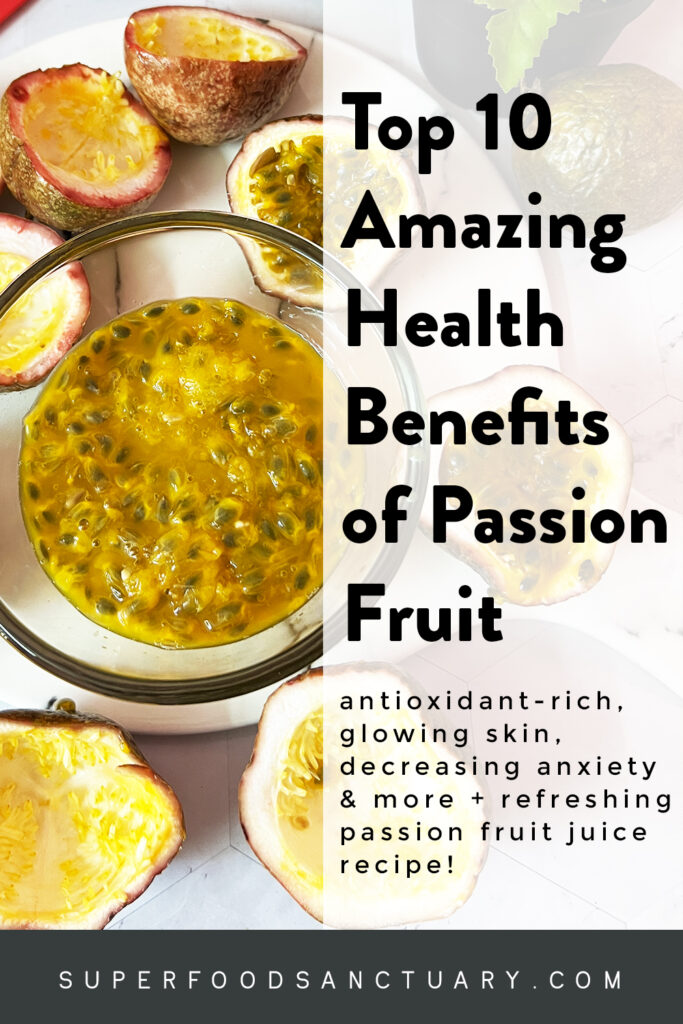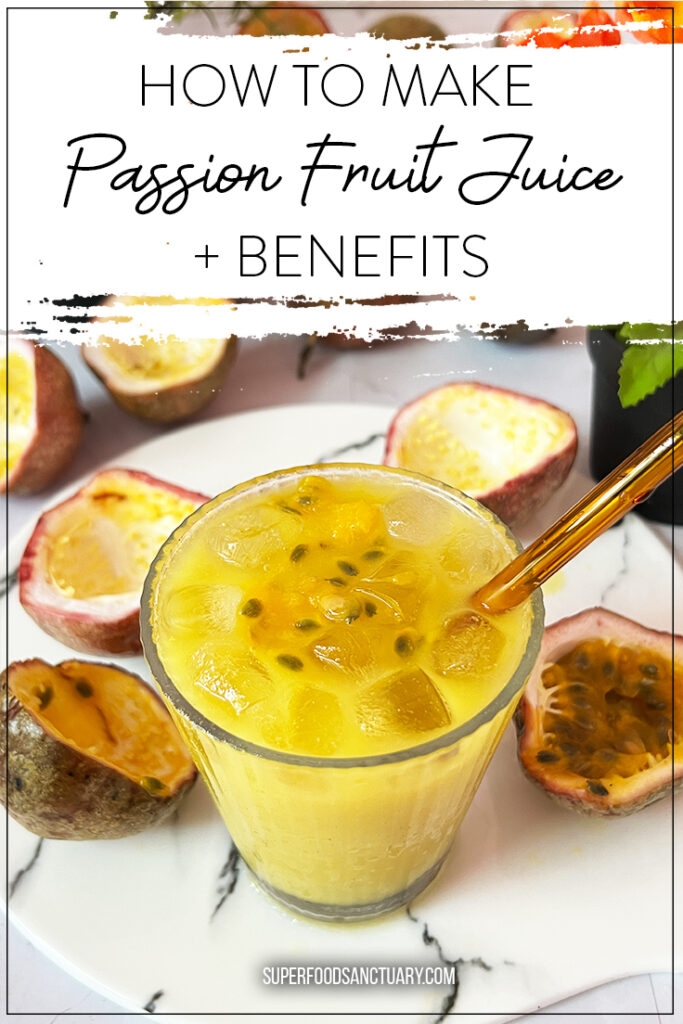Once this exotic yellow/purple fruit that is sweet & tart is cut open, you’ll find tens of small black seeds covered in translucent gel! Let us read about the amazing health benefits of passion fruit and how to make passion fruit juice + other passion fruit recipes!
Passion fruit (scientific name: Passiflora or Granadilla) is a flowering vine that grows in warm tropical climates such as South America, Australia, South & East Africa and India.
There are many varieties of passion fruit that are different in size, color and taste/sweetness. The two most commonly available ones include:
- Passiflora edulis – These are the purple-colored variety of passion fruit, characterized by their small round or oval shape and more of a tart taste rather than sweet.
- Passiflora flavicarpa – These are yellow skin, are usually slightly larger, round or oval shaped and may be the sweetest of all passion fruit, which are known for their slight tartness.
Passion fruit has various names in different parts of the world such as ‘king/queen of fruits,’ ‘fruits of the gods,’ ‘maracujá’, ‘love fruit’ and more.
Inside its semi-hard rind, lots of black seeds are found covered in soft pulp. The seeds and pulp can be eaten as is, or made a juice out of, as is the common way to consume passion fruit.
If you haven’t had it yet, passion fruit is a must-try because it contains powerful antioxidants, a rich nutritional profile and a plethora of health benefits from supporting heart health to fighting anxiety & depression.
Top 10 Health Benefits of Passion Fruit
Below are the top 10 health benefits of passion fruit:

1. Packed with Beneficial Nutrients
Passion fruit is one of the most highly nutritious fruits for your body. It is rich in Vitamin A in particular, which gives it its yellow color due to the presence of the orange pigmented carotenoid, beta carotene. Vitamin A is important for healthy vision, good skin & strong immune system.
Vitamin C is also abundantly found in passion fruit. This vitamin is known to help protect your immune system from diseases & allergies as well as improve the way your skin ages.
Here is the nutritional profile for passion fruit (source). Just one passion fruit without the rind contains the following nutrients:
- 229 IU of vitamin A
- 63 mg of potassium
- 5 mg of magnesium
- 5.4 mg of vitamin C
- 2 mg of calcium
- 0.29 mg of iron
- 1.9 g of fiber
Other nutrients found in passion fruit include Vitamin B6, niacin & phosphorous.
2. Full of Antioxidants
Passion fruit is becoming more and more popular in the world of health conscious people because of its powerful antioxidant content (source).
Antioxidants are compounds that are known to neutralize harmful free radicals (unstable molecules that steal oxygen from healthy cells to become stable, thereby leaving the healthy cells unstable and lifeless which causes damage in the body).
Not only do antioxidants protect the body from free radical damage but also help improve blood flow to the brain and nervous system, reduce cellular stress as well as inflammation in the body. Inflammation is associated with disease including heart disease and Alzheimer’s disease.
3. Boosts the Immune System
Passion fruit is rich in Vitamin C, which is a strong antioxidant that increases the body’s defense against allergens that can weaken the immune system and make us sick with colds, cough, flu and other infections and diseases (source).
Vitamin C boosts the immune system by facilitating the proper absorption of iron from plants, also known as non-heme iron.
Consuming Vitamin C-rich fruits may improve the body’s ability to fight off infections easily.
4. Supports Heart Health
Since it is rich in potassium and low in sodium, passion fruits are good for supporting heart health.
Potassium-rich foods keep the heart healthy by lowering blood pressure, keeping heart rhythm steady, and reducing risk of cardiac arrest. Low levels of potassium have been linked to high blood pressure, heart disease, and stroke in people (source).
A high sodium intake contributes to high rates of high blood pressure, heart attack, and stroke (source).
Eating fruits rich in potassium and low in sodium helps manage high blood pressure and protect heart health.
The fiber in passion fruit pulp and seeds helps prevent the build-up of excess cholesterol or plaque from inside blood vessels, which helps reduce the risk of heart disease.
5. Reduces Anxiety
Although passion flower is more popularly known for having anti-anxiety, sedative and mood-boosting effects, the fruit itself may also help with these.
Passion fruit contains magnesium, a mineral that has been linked to decreased stress and anxiety (source).
The alkaloids in passion fruit may help reduce anxiety and depression and insomnia because they act like a mild sedative. Drinking passion fruit juice not only refreshes and hydrates you, but also helps you calm down & enhances mood so that you are in a more relaxed state.
6. Has a Low Glycemic Index
Although most fruits have a low GI, according to the American Diabetes Association, fruits like dates, melon and pineapple have a higher GI & are not the best choices for those with type 2 diabetes, prediabetes and other health conditions that predispose to the disease (source).
Passion fruit has a low glycemic index (GI) value, which means it does not cause a spike in blood sugar levels after eaten. This means it is a good fruit to eat for those with diabetes, insulin resistance and other disorders that are prone to developing diabetes such as Polycystic Ovary Syndrome.
7. Improves Insulin Sensitivity
Improving insulin sensitivity can help reduce the increased risk of many diseases including diabetes.
Eating passion fruit as a snack or juice can help maintain insulin levels and lower insulin sensitivity because of a compound in them known as piceattanol.
Research has shown that participants in a study who were male and overweight, took 20mg of piceatannol each day for 8 weeks and experienced improved metabolic health, including insulin sensitivity, compared with those who took a placebo (source).
8. Good Source of Fiber
A single serving or just one passion fruit (pulp and seeds) contains 2 grams of dietary fiber.
Fiber is important in promoting good digestive health and regular bowel movements (source).
Soluble fiber is known to help slow digestion, which prevents immediate blood sugar spikes that can be detrimental for those with type 2 diabetes or high blood sugar (source).
Individuals with high intakes of dietary fiber appear to be at significantly lower risk for developing coronary heart disease, stroke, hypertension, diabetes, obesity, and certain gastrointestinal diseases. It also helps lower high blood pressure and serum cholesterol levels (source).
9. For Youthful Glowing Skin
One of the most amazing health benefits of passion fruits is it can improve the health, texture and youthful look of the skin.
This is no surprise as it is full of antioxidants, minerals and vitamins such as Vitamin A, Vitamin C and B-vitamins like Vitamin B6 and B2. Vitamin A and C are both great for boosting collagen and increasing elasticity of the skin, which is beneficial for anti-aging.
Antioxidants like riboflavin and carotene help fight free radicals that cause oxidative stress to skin cells, hence making them lifeless and dull, which in turn causes accelerated development of fine lines and wrinkles.
These nutrients in passion fruit, including potassium, help skin retain moisture and improve blood flow which helps promote and maintain a youthful glow.
Passion fruit also has anti-inflammatory properties which helps soothe red, irritated, acne prone and sensitive skin. Natives from the Amazonian forest used the leaves of passion fruit to make medicinal poultices for wounds, cuts, bruises and pain relief.
10. Good for Your Eyes
Passion fruit contains high levels of beta carotene, a yellow pigment that gives the seeds a yellow/orange color. Beta carotene is converted into Vitamin A in the body.
Vitamin A is beneficial for maintaining healthy vision, preventing age-related macular degeneration, cataracts and night blindness.
How to Make Passion Fruit Juice

Here’s how to make passion fruit juice in an easy and delicious way!
You can treat yourself to this refreshing passion fruit juice recipe, a summer delight to quench your thirst while flooding your body with amazing nutrients!
What you need
- 4 passion fruits
- 2 teaspoons of agave nectar
- Filtered water
- High speed blender
- Fine mesh strainer & silicone spatula
- Pyrex cup & bowl
- Ice cubes
Directions
- Wash the passion fruits thoroughly.
- Cut them in half then gently remove the pulp (with seeds) using a spoon into a bowl.
- Transfer the pulp into a blender and blend till smooth.
- Now strain the pulp using a fine mesh strainer and a silicine spatula to get a smoother but still thick juice.
- Fill a glass with ice cubes then pour in the passion fruit juice you just extracted.
- Top with filtered water then add 2 teaspoons of agave nectar.
- Add passion fruit pulp & seeds from one half of a passion fruit on top of your drink for garnish & extra crunch.
- Stir well and enjoy fresh!
You have reached the end of the article, ’10 Amazing Health Benefits of Passion Fruit, Passion Fruit Juice Recipe & More.’
Leave a Reply